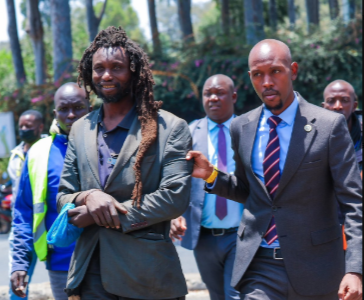
 Nairobi County Environment Chief Officer Geoffrey Mosiria with the man he rescued from the streets on September 24, 2025. /GEOFFREY MOSIRIA/X
Nairobi County Environment Chief Officer Geoffrey Mosiria with the man he rescued from the streets on September 24, 2025. /GEOFFREY MOSIRIA/XFor more than two decades, a man with dreadlocks lived in a shack along the road reserve next to Railways Golf Club in Nairobi.
His home was a carton structure, fragile and open to the harsh weather, directly opposite the Green Park terminus.
It was all he knew after 25 years of surviving in squalor, without healthy food, security, proper shelter, or the dignity of a normal life.
This week, his fortunes changed. Nairobi County Environment Chief Officer Geoffrey Mosiria stepped in and rented a house for him in Dagoreti South, pulling him out of the streets and into the embrace of a community that welcomed him with warmth.
Mosiria announced the move on Tuesday, the same day county enforcement officers demolished another makeshift tree shelter along Jogoo Road, where a different homeless man had been living.
Both men, dreadlocked and worn down by life’s struggles, had spent years on the streets under difficult conditions, often ignored or mocked by passers-by.
But for the man relocated to Dagoreti, the day was nothing short of miraculous. In a video shared on X by Mosiria, residents gathered around to welcome him.
One woman, touched by his story, quickly declared she would take care of him.
“Jirani who developed an interest in Rasta has offered to cook for him, a beautiful reminder that love and humanity still exist,” Mosiria said.
The neighbour herself made her intentions known loudly: “Niko single (I am single),” she said, sparking laughter from Mosiria and those around.
She added, “Mi ni jirani yake, nikisikia shida namsaidia. Akitaka key ya choo nampea (I am his neighbour, if I hear he has a problem, I help him. If he wants the toilet key, I will give it to him).”
Her words lifted the spirits of the gathering. Another woman, a single mother of three, went further—appealing to the man to adopt her children and live with her.
As a gesture of goodwill, the Rasta man handed her child some cash, and a voice in the crowd commented: “Yeye mwenyewe ataamua kama ataishi na wote (He will decide for himself if he will live with all of them).”
“Madam, unaona sasa umepata mzee? (Madam, you see you’ve now found a husband?),” Mosiria teased, prompting her to reply with equal humour: “Mungu ameleta (God has provided).”
Alongside paying his rent, Mosiria and his team also went shopping for household items.
They bought food, body care products, utensils, and cooking gas to ensure he could start afresh in dignity.
This was not the first time Mosiria had reached out. On September 24, he had highlighted the man’s plight but admitted the journey was not easy.
The man had been reluctant to leave the streets.
Over the years, many people, including pastors, had promised to help him but instead used his situation to collect donations.
Their broken promises left him wounded and deeply distrustful.
“This time, I chose to do more than talk. I bought him new clothes, helped him take his first shower in many years, and gave him food,” Mosiria said in an earlier post.
His transformation was striking. Dressed in a black suit and a navy-blue tie, he radiated joy.
Residents marvelled at how healthy and sharp he looked.
The single mother who had joked about marrying him added: “Anisadie kulea mtoto (He should help me raise my child),” as the man stood smiling, ready to embrace a new lease of life.
Mosiria used the opportunity to call on leaders to do more for the homeless.
“Help them, reform them. You will spend like Sh20,000 to change their lives. For this case, we spent around Sh50,000 to change his life. He’s looking neat—even ladies are now saying they have found a husband,” Mosiria said.
The local Nyumba Kumi leader also pledged to keep an eye on him to ensure he does not return to the streets or relapse into drugs.
“We will even take him to church. We are Catholics, and we live like brothers. I’m a contractor too, so if we find construction work, we will give him,” the leader said.
The man himself expressed gratitude for the fresh start.
Turning to the neighbour who offered to support him, he said: “Usikufe roho kunisaidia urudi nyuma, jikaze (Do not lose heart in helping me, don’t give up, be strong).”
But even in his transformation, he remained firm on one thing—his dreadlocks. To him, they are more than just hair; they are part of his culture and identity.
“They tried to shave me recently, and I started bleeding in the mouth,” he claimed.
"Asanteni sana (Thank you very much)," he said for the helpful hand extended to him.
As the man looks forward to a life off the streets, surrounded by neighbours willing to give him a chance, and with a roof over his head for the first time in 25 years, it remains to be seen whether or not politicians will heed Mosiria's plea and rescue other homeless people.
















